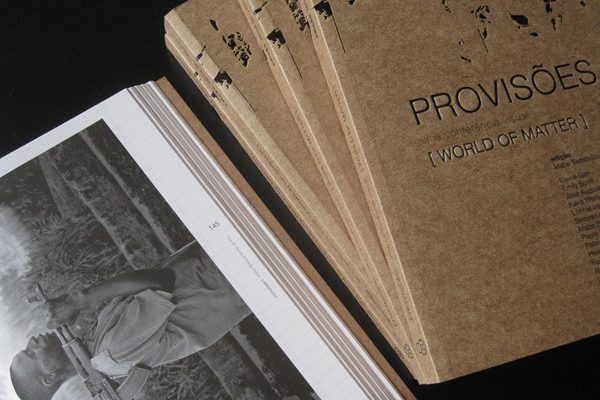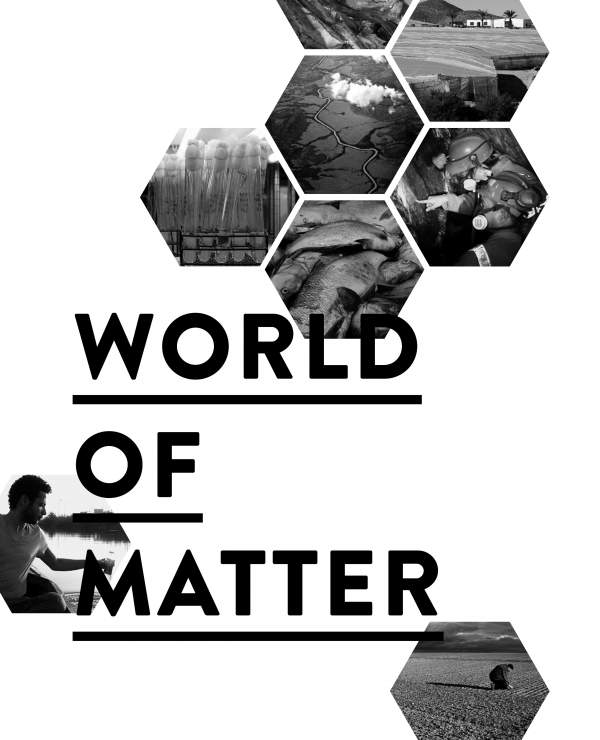- World of Matter
- Instituto Cidades Criativas
- Belo Horizonte, 2013
PROVISÕES
FROM SUPPLY LINES TO A WORLD THAT MATTERS
This volume compiles a series of texts and materials presented at the conference Provisões in Belo Horizonte in April 2012, conceived and organized by Supply Lines – an international research project that investigates the complex ecologies undergrinding natural resource exploitation. The project brings artists, architects and photojournalists together with theorists from the fields of geography, art history and cultural theory. It aims to generate new modes of engagement, audiovisual media, texts, and cartographies, as well as to unpack the relevance and vitality of such material in a series of public events, exhibitions and publications. Focusing on the development of innovative and ethical approaches to renewable and non-renewable resources (agricultural, maritime, fossil, mineral, land, water), Supply Lines considers visual source material a crucial tool for education, activism, and public awareness, particularly in light of increasingly privatized commodity chains and the gated power networks that control them. Subsequent to Provisões, the project will launch World of Matter: a web-based multimedia platform and a full-scale exhibition at HMKV Art and Media Association in Dortmund, Germany, in 2014.
Held in the Brazilian mining state of Minas Gerais, Provisões represented a rich opportunity for Supply Lines to engage with a knowledgeable audience on ongoing aesthetic and theoretical questions related to the processes and relationships that prescribe resources “ecologies,” both here and afar. In a location largely characterized by the massive extraction and export of mineral and agricultural resources, and moreover imbued with a colonial history of violent species displacements, the discussion was fed by valuable inputs from Brazilian speakers and audience members. More than a report of the lively three-day conference, however, this publication is primarily to be read as a workbook for Supply Lines as it evolves towards its first mise-en-scène in an exhibition space.
Humans have exhausted virtually all known resource deposits on the planet with heightening efforts geared toward locating yet undiscovered and untapped reserves. Large-scale mining is penetrating ever deeper layers, multinational land grabs are advancing to remote corners, and the race is on for the neocolonial division of the seabed. In the last sixty years, more natural resources have been raided by humans than in all previous centuries together. This frantic rhythm of ‘progress’ has spurred images of crisis and doom while firing up the competitive rush for new frontiers.
With growing consciousness about global environmental limits, there is urgent need for new discourses and modes of representation that shift resource-related debates from a market driven domain to open platforms for engaged and decentralized public discourse. First and foremost, the assumption that everything we encounter is a resource for human consumption must be challenged, as this anthropogenic vision has led directly to countless environmental and social disasters. The very term “resource” is a technocapitalist concept that Supply Lines seeks to highlight and disrupt. Instead, the term “ecologies” acknowledges a compositionist state of existence that constitutes non-hierarchical interactions between multiplicities of life, matter, and technology.
Since early 2010, the core group of nine has come together for a series of week-long research meetings to develop a common ground for the project. One of the first declared tasks was to expand the notion of natural resources – or “commodities” as traders call them – from hitherto geophysical and economic-industrial contexts toward the aesthetic-philosophical arena. Yet we are aware that if we solely attempt to “culturalise” the discourse on natural resources by multiplying images or forging new terminologies, we fail to address a deeper problem. If we are to speak about a more-than-human world, it will not suffice to build a socio-cultural vocabulary through a human-centric discourse that views the Earth primarily as a provision, object of scientific research, or sphere of human perceptions, experience, and control. To de-centre such anthropocentric perspectives, a more radical shift in thinking is needed. The gradual shift in title from Supply Lines to World of Matter traces this move from a notion of resources understood as a system of supply lines for humans towards a deeper attention to the situated materialities of stuff like gold, rice, oil, fish, land or water and the complex, multispecies entanglements within which they emerge. This considers a planetary perspective on a world that matters.
As a collective response to the dominant resource paradigm of greed and opacity, all contributors to World of Matter have pledged to share material from their current work on an open access platform that connects different files, actors, territories and ideas. Individually, each participant has developed his or her own methodology for intervening into existing discourses. The structure of the website however, as the backbone of the project, is a collective effort. Essentially an entanglement of empirical studies and critical-aesthetic reflections on this same research, the digital platform will offer myriad trajectories, resisting any overarching narrative structure. Rather than full-length videos, all media are edited into a multiplicity of documents and video clips that are configured and interlinked, rendering visible new connections and potential relations between seemingly distinct events, forces, and locations. By connecting a visual document about illicit gold mining in the Amazon basin with a video file of the Nigerian oil delta states or Egyptian land use politics, we aim to activate a variety of possible readings about global flows and histories between these sites. The forthcoming World of Matter web platform and the compilation of short texts and images in the following pages propose diverse processes of producing, undoing and relinking existing narratives to ignite a rethinking of the relation between materials and discourse. More broadly, our project seeks to advance a deeper understanding of resources as intricately entangled ecologies of things, places, and species interactions.
PROVISÕES – uma conferência visual
published by World of Matter, edited by Mabe Bethônico
Portuguese/English, 165 pages, black and white, profusely illustrated
Contributors:
ELAINE GAN, EMILY SCOTT, JOSÉ AUGUSTO PÁDUA, KAKÁ WERÁ, LONNIE VAN BRUMMELEN & SIEBREN DE HAAN, MABE BETHÔNICO, PAULO TAVARES, PETER MÖRTENBÖCK & HELGE MOOSHAMMER, RENATE MARQUEZ, ROGÉRIO HAESBAERT, URSULA BIEMANN, UWE H. MARTIN & FRAUKE HUBER

Book Launch at the Venice Biennial
Maldives Pavilion
31 May 2013
Presentation with Mabe Bethônico, Ursula Biemann, and Emily E. Scott
Location: Gervasuti Foundation, Via Garibaldi, Fondamente Sant’Anna, Castello 995, between Arsenale and Gardini (former Iraqi Pavilion)
RELATED PUBLICATIONS

